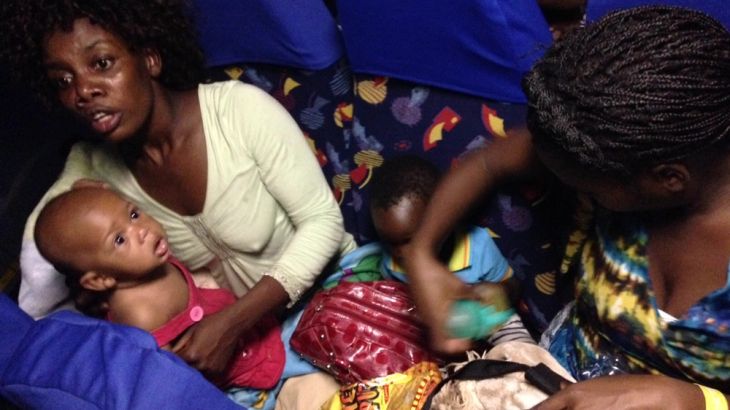Displaced migrants fear transfer from S Africa camp
Migrants in a displacement camp in Kwa-Zulu Natal province fear repatriation and future uncertainties.

Hundreds of immigrants at a displacement camp in South Africa’s coastal province of Kwa-Zulu Natal are refusing to be transferred weeks after xenophobic violence there.
Almost 400 people, including 106 chilrden and 65 women, slept in the open, at the Isipingo Beach Camp on Sunday. They were refusing to leave, after the South African government had arranged buses to transport them to another camp on Saturday.
Keep reading
list of 4 itemsWorld Press Freedom Day: Gaza conflict deadliest for journalists
Israeli firms sold invasive surveillance tech to Indonesia: Report
Abu Ghraib: Iraqi victims’ case against US contractor ends in mistrial
The government has embarked on a plan to reintegrate and repatriate the migrants, but many of the migrants say they do not trust the government and that they would not like to return to their home countries.
Abed Karrim, from the Al Imdaad Foundation, a South African relief organisation said that by nightfall on Sunday people at the camp were still refusing to move.
![Migrants said they were afraid to stay in South Africa but that they were also afraid to return to their home countries [Charles Stratford/Al Jazeera]](/wp-content/uploads/2015/05/e84756e41a3e4fc4a4cac1ee4310c3eb_18.jpeg)
“People have put up their own shacks on the sports ground,” he said. “All the tents provided by relief teams have been removed and there is now no security for the area.”
Al Jazeera’s Charles Stratford, reporting from the Isipingo Beach Camp, on Sunday said there was no food and water at the camp. The municipality had also removed the temporary toilets.
“People are relying on the kindness of neighbours,” he said.
He said the Medecins Sans Frontieres (MSF) aid agency had also been refused access to the camp on Sunday, in an effort to encourage people to leave the camp.
Our correspondent said the occupants in the camp were adamant that they did not want to go back. They say they plan to stick it out, said our correspondent.
Speaking to Al Jazeera on Saturday, one refugee at the camp, Amadi Kanakimana, said: “Our countries, there is a fight so we can’t go [to] Congo there is a fight. We can’t go [to] Burundi, there is a fight. So we can’t go anywhere and we can’t stay here. We need another peace country to go there.”
While the Isipingo Beach Camp was a lot less equipped than the camp the government wanted to move migrants to, this was not this first time the occupants had been moved and many feared that the next camp would also be closed or they would be deported, Al Jazeera’s Stratford said.
“The two buses arranged by the government remained empty,” he said on Sunday.
He said the migrants said they were afraid to stay in South Africa but that they were also afraid to return to their home countries.
He said the almost 400 people in the camp were primarily from Burundi and the Democratic Republic of Congo, with most of the people from Malawi and other countries already having been repatriated.
“Many people are claiming refugee status, but there is the added issue of how many people will receive genuine assylum seeker or refugee status,”
Stratford explained that as some of the Burundians and Congolese were from areas in their home countries that were not involved in conflict they did not qualify for assylum or refugee status and would have to be sent home.
Eric Apelgren, head of international relations in Kwa-Zulu Natal’s capital Durban, told Al Jazeera the government was trying what it could to reintergrate the migrants.
“The reality is we are putting all our resources in getting them back into the community to the countries that they came from and to tell the communities to provide safety and security for them.”
Referring to the reintegration programme, the South African Department of Home Affairs said on its website: “The Department is currently assisting displaced persons to verify their status. In cases where documents have been lost or stolen during the violence, the department checks the system and reissues the relevant documentation.
“In cases where the displaced persons have no documentation or they are in the country illegally, the department still captures their details. Their information and fingerprints are captured in order to provide documentation to facilitate their repatriation.”
The situation remains tense, with some trouble-makers entering the camp and leaving, while relief agencies working in the camp were trying to advise the occupants to go along with the government plan, Al Jazeera’s Stratford said.
Additional reporting by Azad Essa.
![The government has embarked on a plan to reintegrate and repatriate the migrants [Charles Stratford/Al Jazeera]](/wp-content/uploads/2015/05/946cca35fe5e4bb1bbfadaf320d07521_18.jpeg)